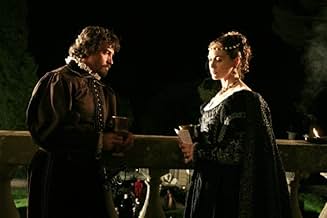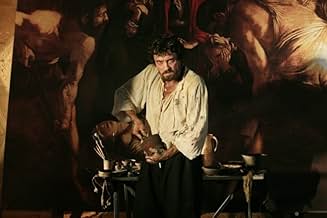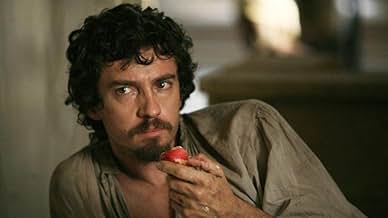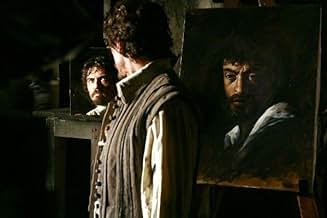Aggiungi una trama nella tua linguaThe tumultuous and adventurous life of Michelangelo Merisi, controversial artist, called by Fate to become the immortal Caravaggio. A violent genius that will dare to defy the ideal vision o... Leggi tuttoThe tumultuous and adventurous life of Michelangelo Merisi, controversial artist, called by Fate to become the immortal Caravaggio. A violent genius that will dare to defy the ideal vision of the world imposed by the Renaissance painters. A provoker that scandalized patrons and i... Leggi tuttoThe tumultuous and adventurous life of Michelangelo Merisi, controversial artist, called by Fate to become the immortal Caravaggio. A violent genius that will dare to defy the ideal vision of the world imposed by the Renaissance painters. A provoker that scandalized patrons and institutions, raising the altars the outcast figures he knew so well: drunkards, vagrants a... Leggi tutto
- Regia
- Sceneggiatura
- Star
- Premi
- 2 vittorie e 10 candidature totali
- Baglione
- (as Blas Roca Rey)
Recensioni in evidenza
Alessio Boni stars as Michelangelo Merisi da Caravaggio, the great Italian Baroque painter. The film is a high-end production, with a huge cast, lavish sets, many location shots in Milan, Rome, Naples, Sicily, and Malta, and beautiful costumes.
I have studied Caravaggio's life and his art, and I think one great strength of the movie is its repeated--and accurate--emphasis on the artist's preference for painting from models, rather than just from sketches.
Also, several of Caravaggio's paintings are "created" while we watch. The ability of the director to find models who look like the men and women in the (real) paintings is uncanny. I've seen many of those paintings, and the actors in the movie truly resemble the people portrayed on the painter's canvas.
As is clear in the movie, as well as in art history books, Caravaggio lived a wild, dissolute, and violent life. However, the movie is possibly more sympathetic to the artist than is historically justified. Rather than as a simple street brawler and murderer, Caravaggio is depicted as a basically decent human being who just happens to have a problem controlling his temper. Most of the duels he fights and the brawls in which he participates are set off by insults to his art or to one of his lovers. He's portrayed as a sort of Italian Cyrano de Bergerac, who only fights to avenge insults and wrongs.
I had some problems with the film. Many of the characters looked similar enough to each other that I had difficulty sorting out which was which. (Is that dark-haired guy his true friend, his false friend, or his enemy?) All the women portrayed are incredibly beautiful. Granted, the high-class courtesans that Caravaggio used as his models were beautiful, but what about the prostitutes on the streets and in the taverns? I'm certain that some of them looked worn, sick, and aged.
Also, the film obliquely suggests the painter's bisexuality, but never really confronts this sexual orientation. Surely, in 2007, audiences could deal with a man's sexual encounters with another man. The film hints at these, but only deals with Caravaggio's heterosexual liaisons.
Despite these shortcomings, I really enjoyed the movie. It would have worked better on the large screen, but it's worth seeing on DVD. If you love art, you must see this film. If you don't love art, you must see this film so that you can learn what you're missing!
This film was produced by RAI and shot for a two-segment TV presentation and shown in New York in a 151-minute version; they say it will be cut for future theatrical screenings. The music is by the veteran if not quite first rank film composer Luis Enriquez Bacalov, the cinematography by veteran and first rank Vittorio Storaro. Alessio Boni, something of a matinée idol in Italy, gives an energetic performance in the lead. He certainly throws himself into it, especially in numerous brawls and sword fights. Subtleties of the personality arguably are not present; but details of the life remain conjectural anyway.
As a sign of his enthusiasm for the role Boni has liked to point out in interviews what he considers key points in common with the artist: his coming from virtually the same area near Milan; also having a priest relative; being 39, the age Caravaggio died, when he did the shooting; above all his coming to Rome virtually penniless at the age of 21 to make his fortune just like the painter. This Caravaggio has several advantages over Derek Jarman's more eccentric lower-budget 1986 version, though it by no means kicks Jarman's brilliantly original film out of the park. Longoni could shoot in the Farnese Palace and grand sets of late-renaissance Rome streets, and he shot with a full Italian cast, in Italian. On the other hand, some of the actors aren't Italian, and the voices are dubbed, which sometimes shows in key scenes. Caravaggio's "only love," Lena, is played by the English-born Sarah Felberbaum. His patron and protector, Cardinal del Monte, is played by the Spaniard Jordi Mollà. English, German, French, and Canadian actors are included in key roles. Will the Italians ever give up thinking the skill of their "doppiatori" makes up for the artificiality of this method? Jarman's much more limited budget film, shot in English with deliberately anachronistic improvised sets and costumes in a single interior, didn't stop him from improvising in ways that cinematically are more interesting; and his film is the more thought-provoking and original one, as well as the one that gives the viewer more time to stop and think. Longoni like Caravaggio fills his canvas with vivid figures; unlike the artist he rarely leaves a blank wall to rest the eye.
Longoni's film nonetheless has many nice scenes. Caravaggio is provided with a gorgeous male lover and companion (Francesco, Luca Capuano) and a bevy of lovely women to paint and make love to. The film gives a better sense of the size and variety of the paintings than Jarman's, though the paintings sometimes look a bit faded and artificial. It's also shown that Caravaggio contemplated corpses by the Tiber to know what death looked like; and saw executions, which he also used for some of his paintings, notably the one of the beheading of John the Baptist. The burning of Giordano Bruno is not only shown, but Bruno's modern intellectual position is telegraphed. The use of contemporary religious choral music to accompany the executions is a nice way to sweeten the pill without lessening the drama. The film is rich in scenes depicting the various brawls Michele got intoin taverns, in ball courts (with the man he allegedly killed, Ranuccio Tomassini, played by an oafish-seeming Maurizio Donadoni), and with a superior fencer from the Knights of Malta. Though the late sequence about Caravaggio's temporary membership in the order and high production of paintings on Malta and in Siracusa provides interesting details, it may need some cutting if a shorter version is really wanted, and for all its lush detail, the sense of an ending is somehow lacking due, perhaps, in part to the busy detail and political complications of this turbulent final section.
Showed as part of the Open Roads: New Italian Cinema series at Lincoln Center, June 2007.
This is a compelling, fairly realistic view of the great artist's life. It's a little long, has some emphasis on relationships and sex which are completely made up, and of course it simplifies his work and how it was made, but it's an Italian production shot in Italy, which gives at least that much authenticity. It is made for television originally, but with high standards (and widescreen format) as with many more recent t.v. productions. Alessio Boni plays the adult artist wonderfully.
Films about artists have to balance between telling the story known through their art and trying to make them human through the people around them. For Caravaggio this means emphasizing his attention to every detail in life, never idealizing his subjects. It also means he's a great protector of women (not known historically) and a total wild fighter, constantly getting tino brawls and sword fights (very much known). His art faced many critics, which are shown here, but he was also hugely admired by many of his contemporary painters, and this isn't so well implied (though he has a few patrons along the way)
His career was short, so we see him getting started in Milan, moving to Rome, then hopping from place to place, partly to avoid going to jail for his various fights (including at least one killing). In all it's a gritty, often bloody experience, probably not so far from the truth, but it flavors the movie straight through. He has such talent, you somehow overlook his violent nature and wish life had treated him better. He died largely of his poor health, and though he was just a few years earlier the most famous painter in Rome, he was soon forgotten. The year was 1610, just as Shakespeare was finishing his last plays and Rembrandt was four years old. It's odd that the movie chose to make an allegory of his death when Caravaggio avoided allegory in his work so thoroughly.
Now we are in a Caravaggio mania, partly leading to this movie, no doubt, and earlier to the more imaginative and yet less watchable Derek Jarman 1986 version. If its his art you want to see, you have to go to Italy. But the movie makes a reasonable entry into his life. As a movie beyond the man, standing alone, it is overly long (3 ½ hours) and filled with details that might not be commanding if it weren't for his fame. But what it gets right is right enough, and the work is unparalleled.
I più visti
Dettagli
- Data di uscita
- Paesi di origine
- Sito ufficiale
- Lingua
- Celebre anche come
- カラヴァッジョ 天才画家の光と影
- Luoghi delle riprese
- Aziende produttrici
- Vedi altri crediti dell’azienda su IMDbPro
- Tempo di esecuzione3 ore
- Colore
- Proporzioni
- 2.00 : 1






























